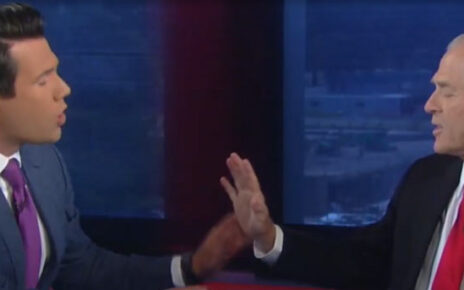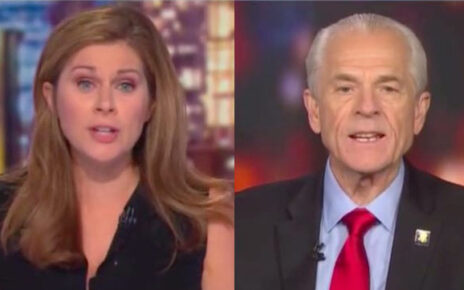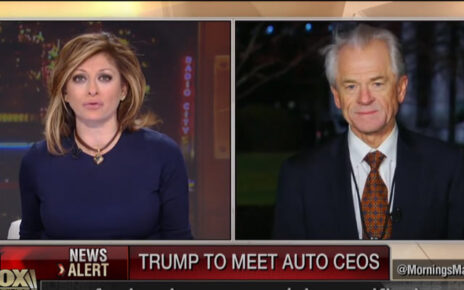December 7, 2018 – CNBC, Closing Bell
TRANSCRIPT
WILFRED FROST: Joining us now is Mr. Navarro from the White House. Thank you very much for joining us, Mr. Navarro.
PETER NAVARRO: My pleasure. It is 10% to 25%.
WILFRED FROST: That was going to be my first question. Is 200% actually being discussed?
PETER NAVARRO: No, no, no, no. 10% to 25%.
WILFRED FROST: Okay.
PETER NAVARRO: Yes, let’s be clear about that. And it’s worth breaking this down. We have 25% on $50 billion of the most technologically sensitive sectors. This is critical. It is part of Section 301 investigation. And then we have additional 10% on $200 billion out of a total of over $500 billion. And to-date we have collected close to $12 billion in tariff revenues, from China, from the steel and aluminum tariffs, and from solar, and washing machines.
WILFRED FROST: Well, I guess, Mr. Navarro, everyone is wondering whether the 90 day time horizon will lead to something definitive or not. And of course the tone following the dinner in Buenos Aires was reported as positive. Since then, the big headline this week has been the arrest of the Huawei CFO. Has that meanfully soured the tone?
PETER NAVARRO: No. It hasn’t internally. Certainly, we’re moving forward. We expect the Chinese side to move forward. I think it is important to point out. In the dinner, which I was privileged to be there, it consisted of the president of China in an unprecedented move spending the first 45 minutes personally laying out in great detail the parameters of what China proposed they would do. And that included much of the structural change that this side is demanding. We simply cannot allow the Chinese to continue their forced technology transfer, the theft of our intellectual property, the the cyber intrusions through business networks, the currency manipulation, the massive subsidies of their state owned enterprises. All of these things were addressed by the Chinese President in a 142 different items in response to our own demands. And this is a critical juncture, in terms, not just of the U.S. and China relationship, but in terms of the global economy. Are we going to have free fair reciprocal trade, which is the vision of President Trump, or are we going have a world in which one of the leading economies in the world — basically is a 16thcentury protectionist and mercantilist. We’ll see how that goes. But that dinner was historic and there’s great chemistry between our President and the President of China. There seemed to be a sincerity in terms of the Chinese. But, we’re clear eyed and the problem here is that if past is prologue, the problem of course is that China has never honored any major commitments made in these areas.
CONTESSA BREWER: So especially on a day following the headline that there may be lengths to the Chinese government in this massive Marriott hack, how do you trust but verify any deal that gets done with the Chinese government in terms of intellectual property, in terms of opening the markets, in terms of the things that really — national security concerns where the Pentagon won’t even sell this technology on bases around the nation?
PETER NAVARRO: Well, you raise the perfect point, to be honest. And I think one of the great things about the leadership of Donald Trump is he’s changed completely the narrative on China forever. Up until the time that President Trump took office, we went by this policy of economic engagement thinking that if we simply engaged with China, they would become more democratic and peaceful and more free market oriented. Just the opposite occurred and here we are in this mess. And so we have the Marriott hack, we have the bright light shown on Huawei, which is a very bad actor in the international arena. The other thing, there’s an excellent article in the “Wall Street Journal,” Pulitzer quality, my judgment on the game that China played to invade our export controls on a very sensitive satellite with military technology. These are the kinds of things that China needs to understand that the United States will no longer tolerate. So in terms of anything that happens within the 90 days, we are open and hopeful that a deal will take place but it has to be structural change, verifiable with actual results in order to make this all go. Otherwise we have to defend ourselves as a nation. And President Trump, great leadership on this. He will stand up for the American worker, for American businesses, American farmers against what is well documented Chinese aggression by the Department of Defense and the Secretary of the State and a wonderful speech by Vice President Mike Pence.
MIKE SANTOLI: Peter, you started out by saying how President Xi in 45 minutes gave a presentation showing a willingness to address all the United States’ concerns and then you say but everything else they have done essentially means that you’re very skeptical, I assume, of the likelihood of them delivering that. In exchange for what was the President suggesting that they would perhaps promise these reforms? In exchange for what from the United States?
PETER NAVARRO: So two things here. The dinner itself, it was a historic event. I think we have the potential here of doing something much grander than Kissinger and Nixon did many, many decades ago, in terms of bringing China fundamentally into the global economy in a completely different way structurally. But yes, there is skepticism, simply because of China’s past reputation on these matters. So I guess we’ll see what happens. But there’s much at stake here, there’s much at stake here. So it’s really up to the Chinese now. In terms of what we give back, I mean therein lies the rub. President Trump has been eloquent in stating that we are the piggy bank of the world. We’re in all these sorts of one sided bad trade deals and the problem that we have whenever we negotiate with whoever we negotiate is they are getting such a great deal they really don’t want to give us anything. So we are not prepared to give them anything in terms of a deal quid pro quo because we are so much behind the eight ball. We are not steal their technology. We are not forcing the technology transfer. We are not manipulating our currency. We are not counterfeiting and pirating Chinese goods and flooding their markets. We are not having state owned enterprises run rampant around the world, basically exploiting the rest of the world. So what is there for us to give? What we have to give is access to our markets, period. The largest market in the world. Access to our financial markets, our capital markets. This is a great gift that we give to other nations. But we’re not going to do it anymore – President Trump’s made it clear – we’re not just going to give that away and be exploited.
WILFRED FROST: Peter, switching focus a little bit. To what extent are you and your colleagues and the President focused on this massive market selloff that we’ve seen once again reignited this week? The S&P 500 down 4.5% for the week.
PETER NAVARRO: So look. We don’t do day-to-day policy in order to move the market. What we do is focus on structural changes that will basically put in place changes that will deliver long-term economic growth. And look, we had the jobs report today. Fantastic numbers on that. One of the great things about that jobs report was the fact that three quarters of the people that were counted in the new numbers today were people who weren’t in the unemployment line. They were people who came off the couches. These are the Trump voters. These are people during the campaign we talked about as being discouraged workers left behind by the Obama administration. So that’s great news. We are putting in place — we have the tax cuts on the corporate side, which are attracting new investments. Steel and aluminum tariffs attract new investments. Everything we do is designed to restructure this economy in a way so that we have long-term growth driven by investment, higher productivity, higher real wages. And that’s what is showing up in the data. So in terms of this stock market, I really think it is a false narrative to blame all of this volatility on China policy and the tariffs. That’s just a false narrative. Trade is a very small percentage with China of our overall economy. What we have basically in my judgement is a Federal Reserve policy which over the past year and a half has led to higher interest rates which have had implications in the housing market, which have strengthened the dollar in a way that has hurt our growth in terms of exports. And the Fed to the credit is moving towards this data-dependent approach where they will actually look and see whether the kinds of rate hikes they have been doing are actually warranted. So I think the market is churching through that right now. But the underlying fundamentals are bullish in this economy and it’s — the market is basically a predictor of whether the economy is going to be strong. And think that you’re going to see if the market will be fine when it takes a good look at this economy.
WILFRED FROST: Well, we’ll have to wait and see if that does happen and if we turn up in the weeks ahead I wanted to ask, Peter, about some of the Tweets we have seen. The president was tweeting in the last hour or so and talking about the Former Secretary of State Rex Tillerson, where he had been positive in the past about Mr. Tillerson and yet today saying that Mr. Tillerson “didn’t have the mental capacity needed. He was dumb as a rock.” Given the president when Mr. Tillerson was in his post was positive about him, do you fear a similar rebuke from the president one day in the future?
PETER NAVARRO: No. I don’t walk in fear. When I’m here my mission is basically to create jobs particularly for men and women of America who work with their hands. My mission is to help President Trump restore Main Street’s faith in Washington by draining the swamp and by providing good jobs. I love the president’s tweets, and apparently the media loves them too because they can’t get enough of them. What I can say now is the leadership we have, when we were for example at the G20 in Argentina sitting at that dinner with the Chinese, looking to left and seeing John Bolton and seeing Mike Pompeo, Steven Mnuchin and seeing Ambassador Robert Lighthizer, Larry Kudlow, to my right was John Kelly, that’s the A team. These are smart tough people. And the American people should be blessed to have the great leadership that President Trump is exerting. And you know, people come and go through the White House. And they come and go in a way which is good for this country, good for the President, good for the administration. It’s the next person up. And it is all good.
CONTESSA BREWER: Finally, what kind of odds would you put on a deal being done within the 90 days that you’ve given China?
PETER NAVARRO: So I’m here in Washington not Las Vegas. So I’ll let the markets handicap that. But what I can tell investors is this: this is a historic time. It is critical for the long-term health of the financial markets for the economy to get this right. We had 15 years of China engaging in predatory behavior basically draining over 70,000 factories from America, over 5 million manufacturing jobs. During that time, we had 2% or less growth. We had stagnant wage growth. We had this so called new normal to sin like a Paul upon the world. If we don’t get the China thing right, not just the United States but for the rest of the world we won’t be able to have the next leg of global growth we are looking for. And again that speaks to the leadership of President Donald J. Trump, he sees that vision, he sees that future, he is willing to stand up in order make that happen. And the door is open to China changing. They know what needs to be done. And we hope that they sincerely take actions not to see they will do it, but to actually do it. And it’s all about structural change. It’s not about cash or commodities. It’s structural change
CONTESSA BREWER: Mr. Navarro, it is great of you to join us. Thank you for all of the time you have given us.
PETER NAVARRO: Everybody have a great weekend.



